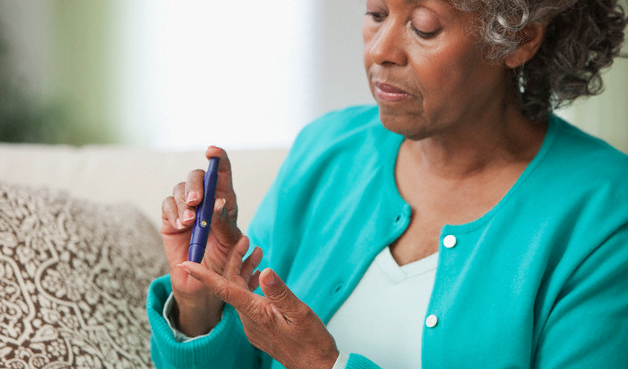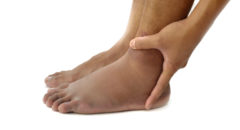
(BlackDoctor.org) — WHAT IS DIABETES?
• Diabetes is a group of diseases
marked by high levels of blood glucose resulting from defects in insulin
production, insulin action, or both. Diabetes can lead to serious complications
and premature death, but people with diabetes can take steps to control the
disease and lower the risk of complications.
• Diabetes is one of the leading causes of death and disability in the
United States. Total health care and
related costs for the treatment of
diabetes run about $132 billion annually.
WHAT ARE THE DIFFERENT TYPES OF DIABETES?
• Type 1 diabetes (formerly
called juvenile diabetes) results when the body’s immune system attacks and
destroys its own insulin-producing beta cells in the pancreas. People with type
1 diabetes must have insulin delivered by injection or a pump. Symptoms of type
1 diabetes – increased thirst and urination, constant hunger, weight loss,
blurred vision, and extreme fatigue – usually develop over a short period of
time. If type 1 diabetes is not diagnosed and treated, a person can lapse into a
life-threatening coma. Type 1 diabetes accounts for 5% to 10% of all diagnosed
cases of diabetes.
• Type 2 diabetes (formerly called adult-onset diabetes) occurs when the
body does not make enough insulin or cannot use the insulin it makes
effectively. This form of diabetes usually develops in adults over the age of 40
but is becoming more prevalent in younger age groups including children and
adolescents. The symptoms of type 2 diabetes – feeling tired or ill, unusual
thirst, frequent urination especially at night, weight loss, blurred vision,
frequent infections, and slow-healing wounds – may develop gradually and may not
be as noticeable as in type 1 diabetes. Some people have no symptoms.Type 2
diabetes accounts for about 90% to 95% of all diagnosed cases of diabetes. The
following factors increase a person’s chances of having type 2 diabetes: a
family history of diabetes, being a member of an ethnic group such as African
Americans, being overweight or obese, having had diabetes while pregnant
(gestational diabetes), having high blood pressure, having abnormal cholesterol
(lipid) levels, and not getting enough physical activity.
• Gestational diabetes develops during pregnancy. Women who have had
gestational diabetes have a 20 to 50 percent chance of developing diabetes,
mostly type 2, in the next 5 – 10 years.
HOW MANY AFRICAN AMERICANS HAVE DIABETES?
• 3.2 million African
Americans ages 20 years and older (or 13.3 percent) have diabetes, one-third of
whom are undiagnosed.
• On average, African Americans are 1.8 times more
likely to have diabetes as non-Hispanic whites of similar age.
WHAT IS THE LINK BETWEEN CARDIOVASCULAR DISEASE AND DIABETES?
•
Cardiovascular disease is the leading cause of death for people with diabetes —
accounting for about 65 percent of all deaths.
• People with diabetes are 2
to 4 times more likely to have heart disease or suffer a stroke than people
without diabetes.
• People with type 2 diabetes have the same high risk for
heart attack as people without diabetes who already have had a heart
attack.
• About 73 percent of people with diabetes also have high blood
pressure.
• Smoking doubles the risk for heart disease in people with
diabetes.
WHAT CAN AFRICAN AMERICANS DO TO PREVENT HEART DISEASE OR STROKE
AND
OTHER DIABETES COMPLICATIONS?
• Diabetes is a self-managed disease.
People with diabetes must take responsibility for their day-to-day care.
•
The chances of having diabetes complications can be reduced or delayed
significantly by keeping blood glucose (blood sugar), blood pressure, and
cholesterol levels (called the ABCs of Diabetes) in the target range. The
National Diabetes Education Program (NDEP) recommends the following targets for
reducing risk of heart disease and stroke for people with diabetes:
A1C (Blood Glucose)
Less than 7 percent
(check at least twice a
year)
Blood Pressure
Less than 130/80 mmHg
(check every doctor’s
visit)
Cholesterol (LDL)
Less than 100 mg/dl
(check once a year)
• People with diabetes can manage their disease by eating healthy foods,
being physically active, taking diabetes medicine as prescribed, and testing
blood glucose levels.
• Community education and support programs can help
people with diabetes and their families to manage their diabetes.
CAN TYPE 2
DIABETES BE PREVENTED?
• YES! The Diabetes Prevention Program (DPP), an important trial
sponsored by the National Institutes of Health, showed that type 2 diabetes can
be delayed or prevented in overweight adults with prediabetes, including African
Americans. Pre-diabetes is a condition where blood glucose levels are higher
than normal, but not yet high enough for a diagnosis of diabetes.
• Risk
factors for pre-diabetes are the same as those listed for type 2 diabetes.
•
To prevent diabetes, the people who participated in the DPP study:
Lost 5 to
7 percent of their body weight (that’s 10 to 15 pounds in a person who weighs
200 pounds).
Were physically active for 30 minutes a day, 5 days a week. Most
participants chose brisk walking.
Made healthier food choices and limited the
amount of calories and fat in their diet.
WHERE CAN I GO FOR MORE
INFORMATION?
For more information about preventing and controlling diabetes, call
1-800-438-5383 or visit the National Diabetes Education Program’s website at www.ndep.nih.gov.
_______________
Adapted
from National Institute of Diabetes and Digestive and Kidney Diseases. National
Diabetes Statistics fact sheet: general information and national estimates on
diabetes in the United States, 2005. Bethesda, MD: U.S.
Department of Health
and Human Services, National Institute of Health, 2005.









